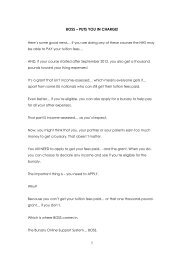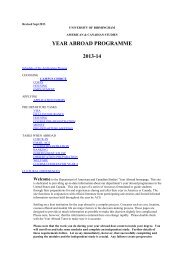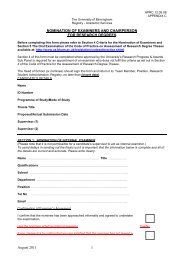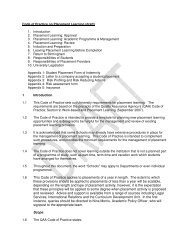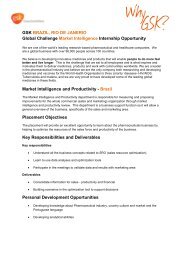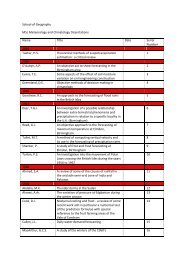Student Survival Guide (PDF - 1.74MB) - University of Birmingham
Student Survival Guide (PDF - 1.74MB) - University of Birmingham
Student Survival Guide (PDF - 1.74MB) - University of Birmingham
You also want an ePaper? Increase the reach of your titles
YUMPU automatically turns print PDFs into web optimized ePapers that Google loves.
<strong>Student</strong> <strong>Survival</strong> <strong>Guide</strong><br />
(for students, by students)<br />
www.birmingham.ac.uk/welcome
2 STUDENT SURVIVAL GUIDE<br />
Introduction<br />
This <strong>Student</strong> <strong>Survival</strong> <strong>Guide</strong> has been put together<br />
for you by a group <strong>of</strong> first year students.<br />
The aim <strong>of</strong> the guide is to give you a range <strong>of</strong><br />
hints and tips on how to survive your first year<br />
at <strong>University</strong>. Who better to tell you than the<br />
students who’ve been through it all already!<br />
We hope you find it helpful.
STUDENT SURVIVAL GUIDE<br />
3
4 STUDENT SURVIVAL GUIDE<br />
Prepare for university<br />
in advance!<br />
It’s never too early to start buying and packing – try to make<br />
sure you leave yourself plenty <strong>of</strong> time to pick up anything you’ve<br />
forgotten. Being prepared will put you at ease and make you<br />
confident that you are ready to go.<br />
p On the Welcome website<br />
(www.birmingham.ac.uk/welcome)<br />
you’ll find a checklist <strong>of</strong> things to bring;<br />
we couldn’t live without an alarm clock<br />
for the 9.00am starts and a lamp for the<br />
late nights!<br />
p You may wish to buy some <strong>of</strong> the designated<br />
books before arrival; however, don’t feel<br />
pressured to buy all the books just yet. The<br />
reading lists for your course can normally be<br />
found online or will be sent to you by your<br />
department, but don’t worry if you don’t<br />
receive a reading list as some departments<br />
don’t send them out. And remember that<br />
secondhand books are just as good.<br />
p Whether it’s stationery or bedding,<br />
don’t panic if you have forgotten something<br />
important – <strong>Birmingham</strong> is the UK’s second<br />
biggest city, so there are plenty <strong>of</strong> shops to<br />
be found, and there is even a Rymans on<br />
campus for discounted stationery.<br />
p In terms <strong>of</strong> doctors – sign up and stock<br />
up! You can register at most surgeries in<br />
the area via the NHS website before arrival,<br />
but try to stock up on any medication before<br />
you leave. You never know when illness might<br />
strike, so be prepared with your usual<br />
remedies too.<br />
p Practise basic skills like cooking, washing,<br />
changing the bedding and cleaning. You’ll<br />
be surprised how many people can’t do these<br />
things. You aren’t alone if you’ve never boiled<br />
an egg! Learning the basics from friends and<br />
family, books or even the internet, will go a<br />
long way to help you when you arrive.
STUDENT SURVIVAL GUIDE<br />
5<br />
p Get thinking about budgeting and how<br />
much student finance you have coming<br />
in. Then you can decide how much you<br />
can afford to spend weekly or monthly.<br />
p You can save money by investing in<br />
discount cards like a 16–25 railcard for<br />
travel, or an ‘NUS card’, but remember that<br />
your <strong>Birmingham</strong> student ID can be used<br />
to obtain student discounts across a lot<br />
<strong>of</strong> High Street stores.<br />
p Searching for the <strong>Birmingham</strong> Fresher’s<br />
groups on Facebook, such as ones for your<br />
halls <strong>of</strong> residence or your course, will allow<br />
you to meet people in a similar position to<br />
you, or maybe even your flatmates; you can<br />
share your worries and excitements with<br />
others in the same boat.<br />
p Don’t worry if your flatmates aren’t<br />
online though – you’ll meet plenty<br />
<strong>of</strong> others to chat to.<br />
p It also helped us to find out information<br />
about our course, opportunities in Welcome<br />
Week and Freshers’ events. Visit the<br />
Welcome website to see what’s available:<br />
www.birmingham.ac.uk/welcome<br />
p If you are living at home, you’ll still need to<br />
prepare for starting <strong>University</strong>, but you will<br />
probably feel less has physically changed<br />
compared to others who have moved away.<br />
Why not get in contact with FOCSOC<br />
(Freshers <strong>of</strong>f Campus Society) and visit<br />
the Staying Local Hub on the Saturday<br />
<strong>of</strong> Arrivals Weekend to meet others in<br />
the same situation.<br />
The terms ‘Welcome Week’<br />
and ‘Freshers’ are both used<br />
interchangeably to describe<br />
the week before teaching<br />
starts, during which a variety<br />
<strong>of</strong> events will be held to<br />
welcome you to the <strong>University</strong>.
6 STUDENT SURVIVAL GUIDE<br />
Getting involved<br />
in Welcome Week!<br />
We remember travelling to <strong>University</strong> for the first time like it<br />
was yesterday. Whether you’re moving here or just travelling<br />
locally, that first journey is a nerve-wracking experience, but<br />
the welcome is amazing.<br />
Moving into halls<br />
p If you’re moving into halls you will be greeted<br />
by members <strong>of</strong> the Residents’ Associations<br />
and <strong>Student</strong> Mentors who will help you with<br />
all <strong>of</strong> your bags and boxes, making you feel<br />
at home right away.<br />
p Don’t worry about unpacking everything<br />
immediately; get door knocking! This is<br />
the best way to introduce yourself and<br />
get to know the people living around you.<br />
p Make sure you have questions ready to break<br />
the ice, and bring things to share with others.<br />
You’ll be surprised at how many friends you<br />
make when you come bearing chocolate<br />
and a pack <strong>of</strong> cards!<br />
p If you don’t seem to get on with your<br />
flatmates, fear not! There will be lots<br />
<strong>of</strong> people to befriend around your halls,<br />
on your course or at societies.<br />
Staying local<br />
p If you live <strong>of</strong>f campus it’s especially important<br />
to get involved, introducing yourself to people<br />
on your course, joining societies and staying<br />
on campus outside <strong>of</strong> your study hours. There<br />
are still lots <strong>of</strong> events for you, so you won’t<br />
miss out.<br />
p The <strong>University</strong> arranges a Staying Local Hub<br />
during Arrivals Weekend, so that you can<br />
meet up with other students in the same<br />
situation before Welcome Week.<br />
p FOCSOC (Freshers Off Campus Society)<br />
puts on lots <strong>of</strong> events specifically for you.
STUDENT SURVIVAL GUIDE<br />
7<br />
General<br />
p Freshers’ packs are available to buy on the<br />
Guild website for the events throughout the<br />
first two weeks. The events range from club<br />
nights to live music, there is even a Freshers’<br />
Ball to top things <strong>of</strong>f.<br />
p Without scaring you, you should be aware<br />
there is a lot <strong>of</strong> pressure during Welcome<br />
to drink, drink and drink. Freshers’ is meant<br />
to be the best two weeks <strong>of</strong> your life, so do<br />
what you enjoy; find the balance between<br />
having fun and being safe and well. Don’t<br />
feel embarrassed if you don’t want to go<br />
out all the time. There are plenty <strong>of</strong> events<br />
catered for a calmer atmosphere, and trust<br />
us; the non-clubbing events are even more<br />
appealing after a few heavy nights out.<br />
p Use Facebook and other social networks<br />
to find groups <strong>of</strong> people to walk down to<br />
your introductory lectures with.<br />
p As well as academic events, there will be<br />
societies fairs and sports fairs to attend in<br />
the first two weeks. Don’t miss out – sign<br />
up for anything that appeals to you! You<br />
don’t have to commit at this stage, you<br />
can decide later what you want to stick<br />
with. There will be lots <strong>of</strong> other new<br />
students like you, so don’t feel intimidated!<br />
p Don’t forget that Freshers’ Week isn’t a<br />
representation <strong>of</strong> the whole year, if you<br />
don’t want it to be. As much as the partying<br />
is great fun for some, if it’s not to your taste<br />
then get involved wherever suits you, and<br />
remember that everything will settle down<br />
a few weeks in.<br />
Welcome Week is a chance<br />
to make new friends, but don’t<br />
panic if you haven’t found your<br />
best mates quite yet. We<br />
personally took a couple <strong>of</strong><br />
months to settle into friendship<br />
groups, and throughout your<br />
entire degree you will constantly<br />
meet new and interesting people.
8 STUDENT SURVIVAL GUIDE<br />
Getting to know<br />
your new home<br />
Getting to know different aspects <strong>of</strong> your new home is important<br />
– you need to feel settled, as you’re going to be here for at least<br />
three years – and who knows, you might like it so much you want<br />
to stay even longer!<br />
Campus<br />
One <strong>of</strong> the most important things when you<br />
arrive at the <strong>University</strong> is getting to know where<br />
everything is. You get a map in your <strong>Student</strong><br />
Diary – so use it!<br />
p Welcome Week is the best time to explore<br />
before your lectures start. Work out where<br />
your first class is beforehand so you don’t<br />
have to endure the embarrassment <strong>of</strong><br />
walking in late.<br />
The surrounding area<br />
It’s a good idea to venture out beyond the<br />
campus and find out what the surrounding area<br />
has to <strong>of</strong>fer. Make sure you check out Selly<br />
Oak, because most students decide to live<br />
there in their second year.<br />
Beyond the obvious – lecture halls and seminar<br />
rooms – there are loads <strong>of</strong> other cool things to<br />
check out on campus:<br />
p Farmers Market – we love this – the ostrich<br />
burgers and falafel wraps are epic, the beer<br />
is homebrewed and the cakes are amazing<br />
p The Barber Institute <strong>of</strong> Fine Arts – an<br />
award-winning FREE art gallery complete<br />
with a café<br />
p The Guild – home <strong>of</strong> Joe’s Bar and the<br />
legendary <strong>University</strong> Dessert Challenge<br />
p Make the most <strong>of</strong> all the campus facilities,<br />
including the food court, SPAR, Rymans,<br />
banks, card shop, the Barber Institute and<br />
the Munrow Sports Centre
STUDENT SURVIVAL GUIDE<br />
9<br />
The city<br />
It can be quite easy to get caught up in the<br />
‘student bubble’ at campus based universities,<br />
like the <strong>University</strong> <strong>of</strong> <strong>Birmingham</strong>.<br />
You could happily spend your three years in the<br />
comfort zone <strong>of</strong> the campus, but why miss out<br />
on the awesome stuff the city has to <strong>of</strong>fer?<br />
p There are all the obvious things – shops,<br />
clubs and cinemas.<br />
p <strong>Birmingham</strong> also has loads <strong>of</strong> unique things<br />
to see: Cadbury World, Sea Life Centre and<br />
the Botanical Gardens.<br />
p Plus tons <strong>of</strong> quirky little markets selling<br />
jewellery, fabrics, food and fish.<br />
p There are also heaps <strong>of</strong> places to eat – make<br />
sure you experience the Balti Triangle, and<br />
Ming Moon in China Town. Plus, check out<br />
great <strong>of</strong>fers on the chain restaurants that are<br />
scattered all over the city centre (like Pizza<br />
Express’s Orange Wednesday deals).<br />
Being in Britain’s second biggest city means<br />
getting from A to B is easy and cheap. Travel<br />
by bus or train (we’re the only uni in Britain to<br />
have its own train station!) to the city centre<br />
and the surrounding areas quickly and<br />
inexpensively – so there’s no excuse not to get<br />
out there and experience everything you can.<br />
Feeling daunted? Take the<br />
opportunity to go on any<br />
tours around campus. And<br />
why not arrange a day trip<br />
into the city with your<br />
flatmates or coursemates?
10 STUDENT SURVIVAL GUIDE<br />
Independent living<br />
For most <strong>of</strong> you this will be the first time you have lived away<br />
from home. There is no doubt that you’re going to face some<br />
<strong>of</strong> the problems and issues that come with this new experience.<br />
p Don’t be scared, but you’re going to have<br />
to learn how to cook, clean and do your own<br />
washing. Be confident and just get started.<br />
Your white socks may come out pink but<br />
that’s all part <strong>of</strong> the learning curve.<br />
p Taking your washing home is fine at first but<br />
eventually you’re going to have to get on and<br />
do it yourself. The washing machine facilities<br />
are great and there are easy steps to top<br />
up your card online. The machines are pretty<br />
self-explanatory but if you’re stuck you’re not<br />
alone. There’ll probably be someone else<br />
hovering around wondering where to put<br />
their washing powder.<br />
p <strong>University</strong> is a time to get your hands dirty.<br />
The toilet will not clean itself and there is<br />
no mysterious man called Henry who will<br />
hoover your carpet. Make sure you stock up<br />
on cleaning products and sort out something<br />
with your flatmates that suits everyone. You’re<br />
not going to make friends by leaving your dirty<br />
pots and pans around the kitchen. Clean up<br />
after yourself!<br />
p Although you’re living independently, you’re<br />
not expected to do everything for yourself<br />
in Halls. If your power goes <strong>of</strong>f, you don’t<br />
have to go in search <strong>of</strong> the fuse box yourself<br />
to try and fix the problem; just ask reception<br />
and they’ll send someone round<br />
to deal with it.<br />
p It’s a good idea to stock up on all the food<br />
you need for a week on one visit to the shops<br />
– it saves time and money. It’s also a good<br />
idea to make a list <strong>of</strong> what you need, so you<br />
won’t forget essentials.<br />
p Cooking is not as hard as it looks. You may<br />
not be a master chef by the end <strong>of</strong> the year<br />
but hopefully you will have improved. There<br />
are lots <strong>of</strong> student cookbooks available and<br />
loads <strong>of</strong> recipes online. Visit the Welcome<br />
website to view a range <strong>of</strong> recipes.
STUDENT SURVIVAL GUIDE<br />
11<br />
p Some <strong>of</strong> you will be on the meal plan, which<br />
means you have money on your card to spend<br />
on food around campus. There are loads <strong>of</strong><br />
different options; you can even use it at<br />
Starbucks on campus! Just be careful not to<br />
use it all up mid-week and also be aware that<br />
money doesn’t carry over onto the next week.<br />
Even if you are on a meal plan you will still<br />
need to cook your own meals if your money<br />
runs out.<br />
p Meeting new people can be scary, especially<br />
if you have to live with them for the next year,<br />
so make a good first impression by being<br />
friendly and not locking yourself in your room.<br />
Having problems with your flatmates is not<br />
uncommon at university – don’t be afraid to<br />
stand up for yourself, but remember to be<br />
considerate <strong>of</strong> others and compromise.<br />
p Earplugs can be a life saver!<br />
– If you don’t seem to get on<br />
with your flatmates, fear not,<br />
as there will be lots <strong>of</strong> different<br />
types <strong>of</strong> people to befriend<br />
around your halls, on your<br />
course or at societies.<br />
– If you need help and support<br />
visit: www.as.bham.ac.uk/support
12 STUDENT SURVIVAL GUIDE<br />
Money Matters<br />
Everyone will develop their own way <strong>of</strong> managing their money,<br />
but here are a few tips we’ve picked up to get you started.<br />
p Work out a weekly budget and stick to it –<br />
it’s brutal, but your loan has to last you the<br />
whole term (so don’t blow it all at the start<br />
<strong>of</strong> the year!).<br />
p Take advantage <strong>of</strong> all your entitlements –<br />
not just grants and bursaries, but all the<br />
perks <strong>of</strong> being a student. Your student card<br />
is your passport to great deals (check out<br />
www.studentbeans.com).<br />
p The thing you’ll probably spend most <strong>of</strong> your<br />
money on is food and drink. There are ways<br />
to reduce the cost <strong>of</strong> your shops:<br />
– Shop around both in stores and online –<br />
you’ll be surprised how much the price<br />
<strong>of</strong> branded items vary from shop to shop.<br />
(Consider buying store brands to save<br />
money too.)<br />
– Avoid shopping when hungry or thirsty –<br />
you’ll end up with a ton <strong>of</strong> stuff you really<br />
don’t need.<br />
– Take advantage <strong>of</strong> supermarket loyalty<br />
cards to get rewarded for your purchases.
STUDENT SURVIVAL GUIDE<br />
13<br />
p There are a few options for food shopping<br />
if you’re living near campus:<br />
– Tesco, near Five Ways<br />
– Waitrose, Home Bargains and small<br />
grocers and butchers (a great alternative<br />
to the main brands) in Harborne<br />
– Sainsbury’s, Tesco and Aldi in Selly Oak<br />
– Do your shopping online and split<br />
the cost <strong>of</strong> delivery<br />
p Where you go will depend on where you<br />
live, but remember that the convenient option<br />
will not usually be the cheapest option.<br />
p Packed lunches are a great money-saving<br />
idea – food can be expensive on campus,<br />
so unless you’re on the meal plan, prepare<br />
food in the morning.<br />
p Did you know you can still get free<br />
prescriptions even after you turn 19?<br />
Fill in an HC1 form to save money.<br />
p Only take out the cash you’re prepared<br />
to spend on a night out and why not<br />
share taxis home – it’s safer too.<br />
We’ve talked about saving money,<br />
but uni also <strong>of</strong>fers you opportunities<br />
to make money.<br />
– The JobZone in the Guild (and<br />
online) is a great place to start if<br />
you’re looking to find part-time<br />
work. It’s important not to do too<br />
much so you can keep up with<br />
your studies, so find a balance<br />
that works for you.<br />
– If you are having financial trouble, talk<br />
to <strong>Student</strong> Services or the ARC in the<br />
Guild, as they may be able to help:<br />
www.as.bham.ac.uk/funding<br />
www.guild<strong>of</strong>students.com<br />
– Follow the <strong>Student</strong> Funding Office<br />
on Twitter @UBSavvySquirrel.
14 STUDENT SURVIVAL GUIDE<br />
Getting into a routine<br />
You’ll discover that a routine during Welcome Week is<br />
out <strong>of</strong> the question – you’ll be too busy having fun, meeting<br />
friends and enjoying your new-found freedom to worry about<br />
when it’s lunch time!<br />
However; it’s important to develop a routine<br />
for yourself when things have settled down, as<br />
no-one else is going to do it for you and there’ll<br />
be much less structure than you’re used to.<br />
Develop a work routine<br />
Staying on top <strong>of</strong> the workload is important,<br />
because ultimately this is why you are here.<br />
p Print out your timetable and use your<br />
<strong>Student</strong> Diary to write down other things<br />
that you need to remember to do.<br />
p Go to as many <strong>of</strong> your classes as possible –<br />
having incomplete notes from missed lectures<br />
is not ideal when it comes to revising.<br />
p Note your plans for each week (essay<br />
deadlines and extracurricular activities) in<br />
your <strong>Student</strong> Diary, so you know what your<br />
priorities are.<br />
p Try to use the time in between your classes<br />
for personal study or assignment preparation.<br />
p Decide in advance when you will be studying<br />
and stick to it.<br />
p Don’t let problems mount up – sorting out<br />
concerns as you encounter them will make<br />
them more manageable.<br />
Get plenty <strong>of</strong> sleep<br />
It is important that you catch up on sleep<br />
after Freshers’ but don’t let this pattern spill<br />
into your lectures.<br />
p Make sure you get<br />
enough sleep, so<br />
you’re up and<br />
ready for those<br />
9.00am starts!<br />
p Try to wake up at<br />
a set time each<br />
day – you will get<br />
into a pattern and<br />
get the most out<br />
<strong>of</strong> your day.<br />
p Use an alarm clock. If<br />
you think they don’t work<br />
for you, be inventive –<br />
set multiple alarms, use high volumes,<br />
put it out <strong>of</strong> reach <strong>of</strong> your bed or even<br />
use a vibrating alarm under your pillow.
STUDENT SURVIVAL GUIDE<br />
15<br />
Have regular, healthy meals<br />
We hate to admit it, but our parents are right –<br />
regular meals are important. They help maintain<br />
energy levels, encourage concentration during<br />
lectures, and fill our rumbling tummies!<br />
p Don’t skip meals – you may think it’s<br />
saving you time, but it’ll actually make<br />
you less effective.<br />
p When you have time to cook, make an<br />
extra portion or two and freeze them,<br />
so you’ve always got something easy<br />
and healthy available.<br />
Make time for socialising and exercise<br />
p All work and no play... you know the rest!<br />
p Make sure you leave some time in your<br />
routine to have some fun – it will help you<br />
concentrate better when you’re studying<br />
and it’s important to get a broad range<br />
<strong>of</strong> experiences from your university life.<br />
Make time for household chores<br />
Consideration is the key to communal living.<br />
And it’ll probably help you concentrate if you’re<br />
living in a clean, tidy environment.<br />
p Agree with your flatmates who will do<br />
what and when – you don’t want to have<br />
arguments about whose turn it is to clean<br />
the kitchen or take out the bins! Decide<br />
early on (before bad habits start) and<br />
stick to it.<br />
p Plan a time to do laundry and do it at the<br />
same time every week – it’ll make it easier<br />
to make sure you have enough clothes for<br />
the week.<br />
Get your parents or guardians<br />
to take you for a big food shop<br />
before you move to uni, so that<br />
you have enough food to last you<br />
throughout Freshers’ Week.
16 STUDENT SURVIVAL GUIDE<br />
Health and wellbeing<br />
A documented side-effect for some new students is the loss<br />
or gain <strong>of</strong> 14 pounds in weight known as ‘the Freshers’ 14’.<br />
The lifestyle overhaul <strong>of</strong> starting university<br />
can be quite challenging, but being aware<br />
<strong>of</strong> the choices you’re making and the impact<br />
they may have on your health is important.<br />
Your mission, if you choose to accept it,<br />
is to avoid the dreaded Freshers’ 14!<br />
Alcohol<br />
While alcohol can seem to dominate students’<br />
lives, it doesn’t have to be that way and certainly<br />
not all <strong>of</strong> the time.<br />
p There are plenty <strong>of</strong> events that don’t centre<br />
around alcohol, which also usually makes<br />
it easier to build friendships.<br />
p Don’t feel pressured to drink every night<br />
during Freshers’ – it’s not a weakness to<br />
miss an event if you don’t fancy it. Many<br />
students find Freshers’ exhausting.<br />
p Be sensible – remember 14–21 units<br />
per week is the recommended limit.<br />
Alternating alcohol with s<strong>of</strong>t drinks<br />
is definitely the way forward.<br />
p Stay safe and stay with your<br />
friends – there’s safety in numbers.<br />
Eating<br />
Food is fuel!<br />
p Preparing meals and having plenty <strong>of</strong> healthy<br />
snacks handy will help you avoid eating crisps<br />
and chocolate.<br />
p There are many useful food outlets on<br />
campus – we have a handy fruit and veg<br />
stall that has lots <strong>of</strong> choice at student prices<br />
and we recommend the jacket potato from<br />
Café Go!<br />
p If you’re not in catered accommodation<br />
it’s a good idea to prepare a packed lunch<br />
at the start <strong>of</strong> the day.<br />
p Make sure you get nutrition from a variety<br />
<strong>of</strong> foods (not just pasta!).<br />
Exercise<br />
With your new environment and lifestyle it’s<br />
easy to forget about exercise, but it can help<br />
you de-stress, as well as stay physically fit.<br />
There are plenty <strong>of</strong> options:
STUDENT SURVIVAL GUIDE<br />
17<br />
p The Munrow Sports Centre provides<br />
deals for students.<br />
p There are lots <strong>of</strong> clubs to make exercising<br />
more fun and they’re not all hardcore sports –<br />
the Dance Society <strong>of</strong>fers plenty <strong>of</strong> new and<br />
exciting forms <strong>of</strong> exercise... try Zumba or<br />
maybe even Salsa!<br />
p Go for a walk – it’s free and who knows<br />
what you might discover round the corner!<br />
Heatlh<br />
And finally, you may find you come down with<br />
a bad cold at the start <strong>of</strong> term, this is usually<br />
called ‘Freshers’ Flu’ but is nothing to worry<br />
about. Be prepared! There’s no perfect solution,<br />
but if you get it, having a supply <strong>of</strong> cold<br />
remedies, throat lozenges, tissues and<br />
a hot water bottle will help you get through.<br />
Homesickness<br />
It’s equally important to be aware <strong>of</strong> mental<br />
wellbeing. Homesickness is inevitable and<br />
it can affect anyone at some point... trust us!<br />
p Talk to people – you’ll be amazed how<br />
many others are feeling the same!<br />
p Be aware <strong>of</strong> the services <strong>of</strong>fered by<br />
the <strong>University</strong> – whether it’s stress,<br />
homesickness, or loneliness, there are<br />
people you can talk to: <strong>Student</strong> Services,<br />
the <strong>Student</strong> Mentor Scheme and your<br />
Welfare Tutors are all on hand to <strong>of</strong>fer<br />
support: www.as.bham.ac.uk/support<br />
p Anxiety and stress are normal, don’t worry<br />
about worrying!<br />
It’s important to eat both before<br />
and after drinking alcohol. It’ll<br />
help you feel much better the<br />
morning after!
18 STUDENT SURVIVAL GUIDE<br />
Becoming an<br />
independent learner<br />
The main difference between college and university, besides<br />
your new-found propensity for eating Pot Noodles for breakfast,<br />
is the importance <strong>of</strong> learning and working independently.<br />
Long gone are the college days <strong>of</strong> 20-hour<br />
weeks, mock exams and set homework; most<br />
university students will find they have a lot less<br />
contact time than they are used to.<br />
It’s tempting, in this scenario, to spend your free<br />
time indulging your love <strong>of</strong> BBC iPlayer, but fall<br />
into this trap and you will find your marks falling.<br />
The time you spend in lectures is the tip <strong>of</strong> the<br />
iceberg when it comes to your degree; so it’s<br />
important to embrace the joys <strong>of</strong> independent<br />
learning as early as you can. Think <strong>of</strong> your<br />
degree as a gym membership; you only<br />
get out what you put in!<br />
p No-one is going to force you to do your work,<br />
so you have to just crack the whip yourself.<br />
Try and get into the routine <strong>of</strong> doing a certain<br />
amount <strong>of</strong> preparation for lectures, seminars<br />
or lab work.<br />
p Keep a list <strong>of</strong> what you need to do for<br />
different modules – it’ll help you keep track<br />
<strong>of</strong> your work and it’s great to see where<br />
you’re making progress!<br />
p Check your @bham<br />
email account<br />
regularly so you<br />
don’t miss important<br />
information.<br />
p Let’s be honest – if you<br />
skip a lecture your tutors<br />
won’t know – until they read your poor<br />
attempt at an essay. You’re paying to be here,<br />
so you might as well turn up to your lectures!<br />
p Make sure you see your Personal Tutor early<br />
and <strong>of</strong>ten, as he/she is your first point <strong>of</strong> call<br />
for help and advice and they will know where<br />
you can go for further help if needed.<br />
p Address academic problems as soon<br />
as they arise so they don’t escalate.<br />
p <strong>University</strong> lecturers don’t tend to sugar-coat<br />
things; feedback is normally direct and to the<br />
point. If you don’t understand the feedback<br />
you’ve been given, feel free to talk to your<br />
tutor about how you can improve.<br />
p Equally, make sure you take the opportunity<br />
to provide your lecturers with feedback by<br />
completing module questionnaires.
STUDENT SURVIVAL GUIDE<br />
19<br />
p If you have an idea on how to improve the<br />
teaching or the course, or if you would like<br />
the chance for a good moan, the <strong>Student</strong><br />
Reps are all ears so get to know them, or<br />
better still, become one yourself.<br />
p Although you’re learning independently,<br />
that doesn’t mean you’re alone. There’s<br />
loads <strong>of</strong> support on campus, including the<br />
Academic Skills Centre, which can help with<br />
maths, essay writing and other useful skills.<br />
See www.as.bham.ac.uk/support<br />
for more details.<br />
p Many courses run Peer-Assisted Study<br />
Sessions (PASS), which help students<br />
learn together: www.pass.bham.ac.uk.<br />
p Halfway through your first year you’ll<br />
have a transition review meeting with your<br />
Personal Tutor about your progress. Write<br />
down any worries or questions you have<br />
and get their advice.<br />
p When you are reading, get into the<br />
habit <strong>of</strong> looking up unfamiliar words.<br />
It will increase your vocabulary, improve<br />
your understanding <strong>of</strong> texts and improve<br />
the quality <strong>of</strong> your written work.<br />
– Library inductions run through<br />
the whole year, so it’s never<br />
too late.<br />
– For study skills and strategies<br />
visit: www.gel.bham.ac.uk
20 STUDENT SURVIVAL GUIDE<br />
Assessed work<br />
and exams<br />
It is very easy to leave your assignments and revision for exams<br />
until the last minute, and we’ve all been there but it is important<br />
to be more organised at university, as there’s a lot more work<br />
involved in completing assignments.<br />
p Referencing an essay is a scary thought,<br />
but your tutors will teach you how to go<br />
about it and the library provides really<br />
helpful referencing guides.<br />
p Try and study at a tidy, distraction-free desk.<br />
p Avoid creating unnecessary stress by getting<br />
to know the library before your assignments<br />
are due. The Main Library is huge but the<br />
librarians are very helpful, so don’t be scared<br />
to ask for help if you don’t know how to find<br />
a book. JustAsk! is a live chat box on the<br />
library website, which is easy to use and<br />
you get a quick response.<br />
p Be proactive and gain better grades by<br />
emailing your essay or assignment plans<br />
to your lecturer, but do it in advance <strong>of</strong><br />
the Christmas or Easter breaks and give<br />
your tutors plenty <strong>of</strong> time to provide you<br />
with feedback.<br />
p Aim to complete work well in advance<br />
so you have time to clarify anything you<br />
don’t understand.<br />
p For every 50 minutes <strong>of</strong> work that you do,<br />
take a 10 minute break. It helps you use<br />
your time more productively (and you may<br />
be able to use this time to do something<br />
useful – eg, your washing, tidy up your<br />
desk, get some food).<br />
p If you’re easily distracted give your phone/<br />
iPod/Internet cable to your flatmate and tell<br />
them you can’t have it back until you’ve done<br />
1000 words or an hour <strong>of</strong> work.<br />
p If you work part-time, make sure you plan<br />
your shifts well in advance so they don’t<br />
clash with deadlines.<br />
p Find a way <strong>of</strong> handling stress in a positive<br />
way: listening to calm music, drawing or<br />
playing football are good examples, or go<br />
along to a workshop to find out how to<br />
cope with exam stress.
STUDENT SURVIVAL GUIDE<br />
21<br />
p Create a colour-coded exam timetable so<br />
you’ve got enough time to revise for each<br />
exam. Share it with your flatmates, so they<br />
will then know when quiet is needed, so<br />
you can concentrate.<br />
p Get to know people in the flats around you<br />
so that when you need quiet in the future<br />
you won’t just be the annoying person who’s<br />
asked for quiet.<br />
p There are plenty <strong>of</strong> quiet study places on<br />
campus – find them and park yourself there<br />
so that you can concentrate on your work<br />
and exam preparation.<br />
p Use a timer that you can stop and start to<br />
time past papers, so you don’t have to find<br />
three hours to do it all at once.<br />
p Try to read your departmental handbook and<br />
the handouts from your introductory lectures.<br />
They cover a range <strong>of</strong> issues, so sit down<br />
with a cup <strong>of</strong> tea and give them a good read<br />
through – you’ll at least know what’s there if<br />
you need to refer back to it.<br />
– Don’t forget that you can talk to your<br />
Personal Tutor about any problems<br />
you are having with your assignments.<br />
– Your Personal Tutor can provide you<br />
with lots <strong>of</strong> academic advice and<br />
support. They have regular <strong>of</strong>fice<br />
hours each week so you can make<br />
an appointment to suit you.<br />
– For details <strong>of</strong> support services visit:<br />
www.as.bham.ac.uk/support
22 STUDENT SURVIVAL GUIDE<br />
Where will I live<br />
after first year?<br />
A few months in and you’ve started to settle into being a student.<br />
You can boil an egg, you’ve decorated your room with posters and<br />
located the cheap bars. You’ve even finally shaken your Freshers’<br />
flu, but beware because now a new disease is gripping your peers:<br />
‘housing fever’.<br />
Housing fever<br />
Suddenly everyone is frantically rounding up<br />
their friends and descending on Selly Oak’s<br />
estate agents with a hunted look in their eyes.<br />
No-one wants to be the only one without a<br />
place to live, but hasty decision-making could<br />
land you with over-priced rent, a house with<br />
a questionable smell or housemates that play<br />
havoc with your last nerve on a daily basis.<br />
Resist the symptoms <strong>of</strong> housing fever and<br />
relax: there are way more student houses<br />
than students; so you won’t end up homeless<br />
(and nor will anyone else, for that matter). Your<br />
friendship group in February is likely to be very<br />
different from October, so wait until after the<br />
Christmas holidays to think about housing.<br />
Follow our survival guide and you’ll be fine:<br />
p Choose flatmates wisely – best friends<br />
aren’t necessarily best housemates (and<br />
moving in with the guy/girl you fancy is<br />
just asking for trouble!)<br />
p Look at plenty <strong>of</strong> houses before committing to<br />
one – there’s no rush, so be picky. The estate<br />
agent may tell you ‘this is the last house<br />
available’, but Selly Oak is crammed full<br />
<strong>of</strong> student houses!<br />
p Decide on important aspects and insist on<br />
them: double glazing, fire alarms, good locks,<br />
especially if the crime rate is high in your area.<br />
p Go through the SHAC service (in the Guild),<br />
as they have lists <strong>of</strong> accredited landlords and<br />
can provide support.<br />
p Consider location: for nurses and medics,<br />
proximity to the hospital might be important,<br />
but Arts students may prefer to be closer to<br />
the Barber.<br />
p All-inclusive bills can be a blessing or a curse.<br />
Carefully tot up your estimated weekly spend,<br />
including TV licence, and figure out if it’s<br />
worth it.<br />
p Keep your parents involved in the process<br />
– they’ve probably been through it all before.<br />
p Get your contract checked by SHAC before<br />
signing it!<br />
p Know your rights when it comes to estate<br />
agents – they shouldn’t be charging you to<br />
look at houses.
STUDENT SURVIVAL GUIDE<br />
23<br />
– Looking for flatmates? Try attending mixing<br />
events or advertising (or responding to adverts)<br />
for flatmates on the SHAC website.<br />
– You don’t necessarily have to move into<br />
a house. There are several other options:<br />
– Third party halls such as Victoria Halls<br />
– Limited spaces in <strong>University</strong> halls<br />
for second year students<br />
– <strong>University</strong>-owned halls in Selly Oak (Jarratt<br />
Hall), so you can still be in halls, but close<br />
to Selly Oak<br />
– There is plenty <strong>of</strong> support available and choosing<br />
housing is lots <strong>of</strong> fun.<br />
So in summary: what we’re really trying<br />
to say is – relax, don’t panic and be aware<br />
that there’s lots <strong>of</strong> support if you need it.<br />
Welcome to the <strong>University</strong> <strong>of</strong> <strong>Birmingham</strong>.<br />
Enjoy it!
Edgbaston, <strong>Birmingham</strong>,<br />
B15 2TT, United Kingdom<br />
www.birmingham.ac.uk<br />
6968 © <strong>University</strong> <strong>of</strong> <strong>Birmingham</strong> 2012. Printed on a recycled grade paper containing 100% post-consumer waste.


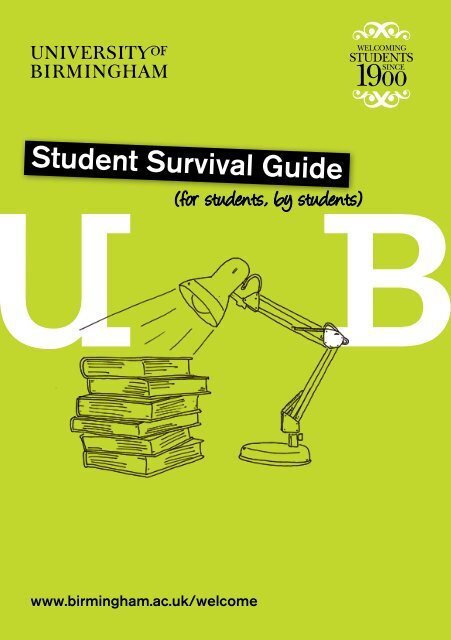
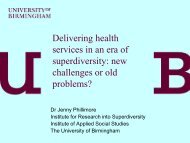
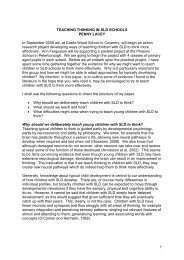

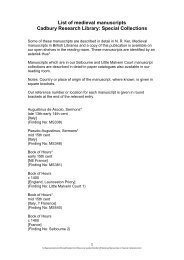
![Benyamin Asadipour-Farsani [EngD Conference abstract]](https://img.yumpu.com/51622940/1/184x260/benyamin-asadipour-farsani-engd-conference-abstract.jpg?quality=85)
